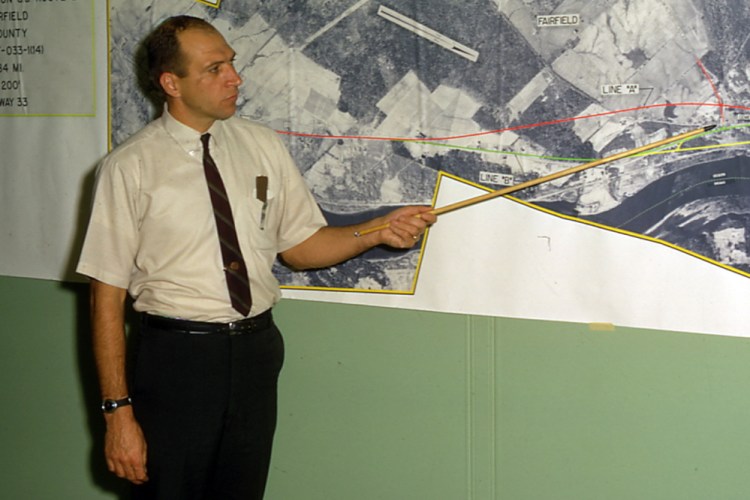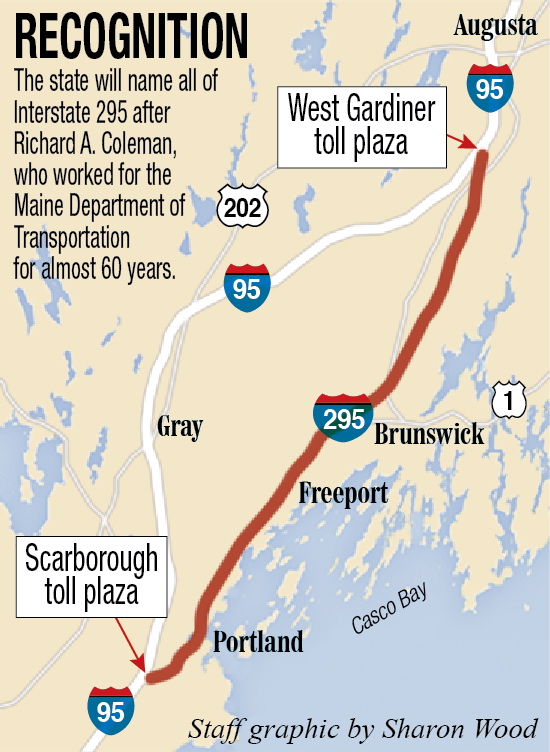If you’ve driven in Maine, it’s likely you traveled on roads and bridges Richard Coleman had a hand in creating.
Coleman, an Augusta native, has been with the Maine Department of Transportation since 1956, the year Congress approved creating the nation’s interstate highway system. He has worked on projects ranging from the construction of the interstate system in Maine in the 1960s and 1970s to the Penobscot Narrows Bridge completed in 2006.
Later this year, one of those projects, Interstate 295, will be named after Coleman in recognition of his decades of work for the state.
The Maine Senate and House of Representatives unanimously approved the bill naming the highway from the tollbooth in Scarborough to the tollbooth in West Gardiner after Coleman, and it became a law at the end of last month.
“It’s hard to think of anybody that deserves the honor more than Dick does,” said Sen. Roger Katz, who sponsored the legislation.
Katz, a Republican who represents Augusta, China, Oakland, Sidney and Vassalboro, said there was no hesitation to name the highway after Coleman once lawmakers heard what a legend he is in the department. Both Commissioner David Bernhardt and Chief Engineer Joyce Noel Taylor submitted testimony supporting the bill on behalf of themselves, not the department.
“Very few people have heard of Dick Coleman,” Katz said, “but as he drives around the state, he must feel a great deal of pride looking at his decades of work.”
Coleman, 83, declined an interview with the Kennebec Journal about the naming of the highway, saying that although it’s humbling, he felt uncomfortable with the recognition.
Those who know Coleman said they weren’t surprised at his resistance to talk about it.
One of his seven children, Tom Coleman, said his father is from a generation that worked hard to do good work without seeking any recognition or accolades.
“Attention is the last thing he wants, but I believe on some level, it is gratifying to be recognized for his service,” he said.
Katz estimated that the state has named 110 highways and bridges after individuals or groups, but only a few public servants have been honored. Katz said Coleman doesn’t think the highway should be named after him, “but with all due respect, he’s wrong.”
Taylor said in her testimony that she was sure Coleman found the attention embarrassing, but that he was very deserving of the honor, saying Coleman is the engineer she wanted to be.
Bernhardt, who Coleman hired in 1984, decades before Bernhardt became commissioner, described Coleman as a jack-of-all-trades, a consummate engineer with unparalleled knowledge. He said Coleman worked in the “glory days” of the transportation department when it was building major, multi-lane highways, roads that have remained the state’s primary transportation infrastructure decades later.
“A lot of the things that happened in the ’60s and ’70s would not have happened without Dick Coleman,” Bernhardt said.
Even as chief engineer, Coleman kept in touch with the young engineers in the department, he said. When Bernhardt passed his engineering exam after four years in the department, Coleman walked up to his desk to tell him personally that he had passed, Bernhardt said.
“When the chief engineer comes up to you and says, ‘Dave, you passed the test,’ that’s huge,” he said.
Coleman, who proctored Taylor’s engineering test, was always open to talking to younger engineers, but he also challenged them, Taylor said. He helped develop the department’s best and brightest engineers, she said.
“He was a real mentor to an awful lot of people, and you really drove to measure up to his standards, but in a good way,” she said.
Taylor, who is now the chief engineer, said Coleman always kept the human element in mind. As a young engineer, Taylor said she looked up to Coleman and learned from his conversations with other managers to consider the impact on other people.
“He always cared about the citizens of Maine, about our customers, the traveling public,” she said.
Coleman now works in the department’s legal office and works with property owners impacted by transportation projects.
Taylor said after the commissioner asked her to become the chief engineer, Coleman approached her and told her how excited he was for her and that he knew she would do great things.
“To have that come from him meant the world,” she said. “I really can’t begin to tell you what confidence that helped me have.”
Coleman’s son, Tom Coleman, who lives in Freeport, said he remembers his dad driving with him on I-295 while it was under construction and only a gravel road. At the time, he said he doesn’t think he and his siblings realized the importance and significance of their father’s work, but they’re proud of his career and work ethic.
Later this year, the department will recognize the significance of his work by installing signs designating I-295 as the Richard A. Coleman Highway, a 53-mile road Coleman now frequently drives with his wife of 61 years, Jacquelyn, to visit their children and grandchild.
Paul Koenig — 621-5663
Twitter: @paul_koenig
Copy the Story LinkSend questions/comments to the editors.




Success. Please wait for the page to reload. If the page does not reload within 5 seconds, please refresh the page.
Enter your email and password to access comments.
Hi, to comment on stories you must . This profile is in addition to your subscription and website login.
Already have a commenting profile? .
Invalid username/password.
Please check your email to confirm and complete your registration.
Only subscribers are eligible to post comments. Please subscribe or login first for digital access. Here’s why.
Use the form below to reset your password. When you've submitted your account email, we will send an email with a reset code.